


June 2023 • Vol. 36 No. 6 auto DEALER M A ss A chus E tts The official publication of the Massachusetts State Automobile Dealers Association, Inc Our Federal Government Takes No Holiday Our Federal Government Takes No Holiday Dealers Urged to Participate in NADA Washington Conference

Robert O’Koniewski, Esq. executive Vice President rokoniewski@msada.org


Jean Fabrizio Director of Administration jfabrizio@msada.org
Robert O’Koniewski,
e
Subscriptions provided annually to Massachusetts member dealers. All address changes should be submitted to MSADA by e-mail: jfabrizio@msada.org
www.msada.org Massachusetts Auto Dealer JUNE 2023 The official publication of the Massachusetts State Automobile Dealers Association, Inc
A ff
St
Directory
Auto De A ler MAg A zine
Esq.
xecutive editor MSADA o ne McKinley Square Sixth f loor Boston, MA 02109
auto DEALER M A ss A chus E tts Auto Dealer is published by the Massachusetts State Automobile Dealers Association, inc. to provide information about the Bay State auto retail industry and news of MSADA and its membership. AD Directory Burns & levinson, 23 ethos, 2 nancy Phillips Associates, 21 gW Marketing Services, 20 reynolds & reynolds, 11 o’connor & Drew + Withum, 32 ADVertiSing rAteS Join us on twitter at @MassAutoDealers Quarter Page: $450 Half Page: $700 full Page: $1,400 Back cover: $1,800 inside front: $1,700 inside Back: $1,600 tABle of contentS
From the President: government’s reach touches uS All 5 AssoCiAte memBers direCtorY 6 the roUndUP: Full Compliance of safeguards rule required 9 LeGisLAtiVe sCoreCArd 10 LeGAL: employment obligations During Dealership Purchases and Sales 12 AUto oUtLooK 16 Cover Story: our federal government takes no Holiday 20 neWs from Around the horn 22 ACCoUntinG: Warranty reimbursemet — Post Pandemic 24 ACCoUntinG: Putting the ‘tax’ Back in taxachusetts 26 LeGAL: Buyer Beware – oeMs increasingly exercising their rights of first refusal 26 nAdA mArKet BeAt 28 AiAdA: electric Vehicle Push Sparks global trade tensions 29 trUCK Corner: AtD’s truck industry forum and legislative fly-in: What you Missed 30 nAdA UPdAte: Washington conference on the Horizon
4
Government’s Reach Touches Us All
By Jeb Balise, MSADA President
Over the last several weeks, dealers have seen first-hand how our government’s reach – some would say overreach – touches us all, and not in helpful ways. The breadth of government is not insubstantial.
On June 9, enforcement of the long-anticipated Safeguards Rule issued by the Federal Trade Commission in late 2021 went fully live, so all dealers must now be in compliance with every aspect of the Rule.
Also, on June 1, our Massachusetts Attorney General began enforcement of the 2020 amendments to our decade-old right to repair law. Unfortunately for dealers, while the vehicle manufacturers and the RTR coalition continue to battle out the legality of our state law in relation to federal regulations and laws, we dealers must now hand out to every “prospective buyer” – undefined in the law – a consumer notice drafted by the AG explaining the telematics existence in the cars and trucks we sell. Failure to provide the consumer notice can result in a dealership losing its ability to sell and service vehicles as a Class 1 dealer. We are pursuing a change in that law on Beacon Hill.
As all the interested parties await a decision from the federal court judge in the manufacturers’ lawsuit, the National Highway Transportation Safety Administration dropped a letter on the manufacturers detailing how the Massachusetts RTR law conflicts with federal laws and rules. The letter was immediately provided to the federal court as well. Just more gasoline on the fire.
Regardless of the final decision, the ruling most likely will be appealed – thereby continuing the uncertainty of how the manufacturers will treat the initiation of telematic services in their vehicles, which are in place to enhance vehicle safety and other services designed to benefit consumers, our customers.
Further, as you can see in our cover story, there is a full slate of federal matters NADA, AIADA, and MSADA all must confront. Otherwise, our Members of Congress may feel compelled to act unfettered by any input from our industry.
Bottom line: Those in our industry cannot bury their heads in the sand. Government reach, and overreach, are here to stay. We need to be involved with our policy makers to ensure our points of view are heard. When our – your – dealer associations – NADA, MSADA, AIADA – ring the bell to ask you to get involved, please consider joining in our efforts. For example, the next NADA Washington Conference will be here before you know it – September 12-13. Rest assured – What happens in a political vacuum, with no dealer input, is never helpful to our Main Street businesses.
Msada Board
Barnstable County
Brad tracy, tracy Volkswagen
Berkshire County
Brian Bedard, Bedard Brothers Auto Sales
Bristol County
richard Mastria, Mastria Auto group
Essex County
William Deluca iii
Bill Deluca family of Dealerships
Franklin County [open]
Hampden County
Jeb Balise, Balise Auto group
Hampshire County
Bryan Burke, Burke chevrolet
Middlesex County
frank Hanenberger, MetroWest Subaru

Norfolk County
Jack Madden, Jr., Jack Madden ford
charles tufankjian, toyota Scion of Braintree
Plymouth County
christine Alicandro, Marty’s Buick gMc isuzu
Suffolk County
robert Boch, expressway toyota
Worcester County
Steven Sewell, Westboro chrysler
Dodge ram Jeep
Steve Salvadore, Salvadore Auto
Medium/Heavy-Duty Truck Dealer Director-at-Large [open]
Immediate Past President
chris connolly, Jr., Herb connolly chevrolet
NADA Director
Scott Dube, Mcgovern Hyundai rt.93
OFFICERs
President, Jeb Balise
Vice President, Steve Sewell
Treasurer, Jack Madden, Jr.
Clerk, c harles tufankjian
From the President JUNE 2023 Massachusetts Auto Dealer www.msada.org
MSADA 4
t
Associate Members

MSADA A SS oci Ate M e M ber D irectory
ACV Auctions
Steve Sirko (856) 381-3914
ADESA
Jack Neshe (508) 626-7000
Albin, Randall & Bennett
Barton D. Haag (207) 772-1981
Ally Financial
Maryanne Recupero (617) 997-9574
American Fidelity Assurance Co.
Kathleen Weisenbach (402) 523-5945
America’s Auto Auction Boston
Jim Lamb (781) 596-8500
Armatus Dealer Uplift
Joe Jankowski (410) 391-5701
Auto Auction of New England
Steven DeLuca (603) 437-5700
Automotive Search Group
Howard Weisberg (508) 620-6300
Bank of America Merrill Lynch
Dan Duda and Nancy Price (781) 534-8543
BCI Financial Corp.
Timothy Rourke (203) 439-9400
Bellavia Blatt
Leonard Bellavia (516) 873-3000
Bernstein Shur PA
Ned Sackman (603) 623-8700
Broadway Equipment Company
Fred Bauer (860) 798-5869
Burns & Levinson LLP
Paul Marshall Harris (617) 345-3854
Sarah Decatur Judge (617) 345-3211
CDK Global
Rob Steele (508) 564-1346
Chase Auto
Ken Miller (508) 902-8908
Clifton Larson Allen
Rick Parmelee (860) 982-9307
ComplyNet
Adam Crowell (614) 634-8843
Cooperative Systems
Scott Spatz (860) 250-4965
Cox Automotive
Ernest Lattimer (516) 547-2242
CVR
John Alviggi (267) 419-3261
Dave Cantin Group
Woody Woodward (401) 465-7000
DealerSafeGuardSolutions
Doug Fusco (972) 740-8638
DealerShop
Ken Grove (248) 444-6283
Brian Fleischman (716) 864-0379
Downey & Company
Paul McGovern (781) 849-3100
DP Sales Distributors
Andrew Prussack {631) 842-7549
Driving Dealer Performance
Kimberly Guerin (978) 760-0322
Eastern Bank
David Sawyer (617) 620-3484
EasyCare New England
Greg Gomer (617) 967-0303
Electric Supply Center
Jennifer Williams (781) 265-4272
Enterprise Rent-A-Car
Timothy Allard (602) 818-3607
Ethos Group, Inc.
Drew Spring (617) 694-9761
F&I Direct
Sean Wiita (508) 414-0706
Michelle Salas (508) 599-0081
F & I Resources
Jason Bayko (508) 624-4344
Federated Insurance
Matt Johnson (606) 923-6350
Fisher Phillips LLP
Joe Ambash (617) 532-9320
Jeff Fritz (617) 532-9325
Josh Nadreau (617) 532-9323
GW Marketing Services
Gordon Wisbach (857) 404-0226
Hilb Group
James Pietro (508) 791-5566
Huntington National Bank
Michael Ham (740) 815-5085
JMA Group
Chris “KC” Hwang (954) 415-6961
John W. Furrh Associates Inc.
Pamela Barr (508) 824-4939
Key Bank
Mark Flibotte (617) 385-6232
KPA
Abe Cohen (503) 902-6567
LocaliQ Automotive
Jay Pelland (508) 626-4334
LoJack by Spireon
Ashvir Toor and Robin Dukes (800) 557-1449
LotLinx
Giovanna Scognemiglio (310) 526-1463
M & T Credit Corp.
John Federici (508) 699-3576
Management Developers, Inc.
Dale Boch (617) 312-2100
McWalter Volunteer Benefits Group
Shawn Allen (617) 483-0359
Merchant Advocate, LLC
Dan Giordano (973) 897-2778
Mintz Levin
Kurt Steinkrauss (617) 542-6000
Murtha Cullina
Thomas Vangel (617) 457-4000
Nancy Phillips Associates, Inc.
Nancy Phillips (603) 658-0004
NEAD Insurance Trust
Charles Muise (781) 706-6944
Northeast Dealer Services
Johna Cutlip (401) 243-7331
OCD Tech
Michael Hammond (844) 623-8324
O’Connor & Drew, P.C. + Withum
Kevin Carnes (617) 471-1120
Performance Management Group, Inc.
Dale Ducasse (508) 393-1400
Piper Consulting
Jim Piper (207) 754-0789
Pro-Vigil
Sasha Lam-Plattes (408) 569-2385
Pullman & Comley LLC
James F. Martin, Esq. (413) 314-6160
Resources Management Group
J. Gregory Hoffman (800) 761-4546
Reynolds & Reynolds
Austin Ziske (802) 505-0016
Rinn Advisors
John Corcoran (617) 480-6693
Rockland Trust Co.
Joseph Herzog (508)-830-3241
Samet & Company
John J. Czyzewski (617) 731-1222
Santander Bank
Richard Anderson (401) 432-0749
Chris Peck (508) 314-1283
Schlossberg, LLC
Michael O’Neil, Esq. (781) 848-5028
Shepherd & Goldstein CPA
Ron Masiello (508) 757-3311
Southern Auto Auction
Joe Derohanian (860) 292-7500
Sprague Energy
Robert Savary (603) 430-7254
The Towne Law Firm P.C.
James T. Towne, Jr. (518) 452-1800
TrueCar
Pat Watson (803) 360-6094
Truist
Andrew Carmer (401) 409-9467
US Bank
Vincent Gaglia (716) 649-0581
Wallbox USA, Inc.
Sean Ugrin (720) 220-1711
Wells Fargo Dealer Services
Josh Tobin (508) 951-8334
Windwalker
Herby Duverne (617) 797-9316
Zurich American Insurance Company
Steven Megee (774) 210-0092
5 www.msada.org Massachusetts Auto Dealer JUNE 2023
Full Compliance of Safeguards Rule Required
By Robert O’Koniewski, Esq.
MSADA Executive Vice President
rokoniewski@msada.org
Follow us on Twitter • @MassAutoDealers
As we have explained over the last 20 months, the Federal Trade Commission requires dealerships and other businesses to be in full compliance with all pieces of the Safeguards Rule beginning June 9. We have not heard of, nor do we expect, any imminent extensions, so the time for preparation has ended; compliance implementation must be commenced.
Since December 2021, your MSADA and the National Automobile Dealers Association have issued scores of writings and conducted numerous webinars regarding the Rule’s implications for dealerships – so your awareness should not be lacking. But have your actions met the Rule’s compliance expectations?
The Federal Trade Commission first issued “Standards for Safeguarding Customer Information” (the Safeguards Rule) in 2002, under its authority in the Gramm-Leach-Bliley Act, and it took effect on May 23, 2003. On December 9, 2021, after several years of notice, public hearings, and comment, the FTC published revisions to the Rule, expanding many of the requirements applicable to dealerships. Most of these new requirements were made applicable effective December 9, 2022. In November 2022, however, the FTC pushed full compliance with chunks of the Rule until June 9, 2023. That day has arrived.

There is quite a lot that dealers must do to comply with the Rule’s requirements. Compliance with the Rule is complicated and time-consuming. As dealers have learned over the last year or
so, compliance is not a simple task that can be undertaken lightly or quickly, or simply outsourced to a vendor. If you are still behind the eight-ball in your compliance efforts, NADA has made available guides, including a comprehensive Driven Guide for dealers that contains step-bystep instructions for compliance, program templates, webinars, workshop sessions, third-party and governmental resources, vendor services, and more at www.nada.org/safeguardsrule.
Moreover, your MSADA has several associate members with expertise in this realm whom you can contact, all of whom have conducted webinars for our member dealers.
Finally, as for enforcement, we cannot offer a guess in what form the FTC enforcement actions will manifest themselves. The enforcement risks can come from not only potential FTC compliance actions but also actions by our Attorney General and private rights of action. In the past, for example, the FTC has focused on situations where a breach occurred and was made public and then brought a subsequent enforcement action. The FTC, however, is not prohibited from demanding information about Rule compliance based on referrals, tips, or just plain, good ol’ enforcement sweeps. Since the current FTC administration is undeniably anti-business and anti-dealer, this is not beyond the realm of possibility.
The cost of an action against your dealership can be considerable. This would include FTC penalties as well as actual and punitive damages
6 JUNE 2023 Massachusetts Auto Dealer www.msada.org t he r oundu P
arising from claims along with attorneys’ fees and costs. If I may quote directly from the NADA’s Safeguards Rule Guide regarding enforcement penalties, on page 8:
“The penalties for not complying with the Revised Safeguards Rule can be extensive – and expensive. The FTC can initiate an enforcement action against automobile dealers under the authority granted to them in [the FTC Act]. Penalties may include long-term consent decrees with your companies and sometimes your executives, extensive injunctive relief, and potential monetary fines for violations of the consent decree. While the FTC cannot seek monetary penalties for first-time violations of the Safeguards Rule, it often seeks to identify violations for which it otherwise can seek money. Further, the FTC can seek up to $50,120 per consent order violation, and the FTC can take an expansive view of what a ‘violation’ is, depending on the circumstances – particularly if there are issues involving multiple customer records.”
If, for some reason, you still have not started, we suggest you do not wait any longer to commence this project. You will need to work with your advisors, staff, attorneys, vendors, and other pertinent parties. As we have articulated since December 2021, this is not optional; this is not a mere suggestion for conducting best practices. Begin taking the steps necessary to comply with the new requirements to protect your dealership and your customers.
Unfortunately for dealerships and other affected businesses, there will be substantial initial and annual expenditures for which you will have no direct return on that investment other than the peace of mind that you prospectively have protected your business from incurring large financial penalties and your customers from the consequences of a potentially life-altering breaches.
As in all compliance matters, keep this in mind: What is your level of risk to bet that you will not be the one impala in the herd that the lion catches today for his mid-afternoon repast?
FY24 Budget, Tax Relief Bills Head to Conference
July 1 is the constitutionally required date for the start of the state’s fiscal year – a date the legislature and governor have had a casual interest in meeting over the past decade. This year has an added twist, however. In addition to resolving their differences on each’s competing $56 billion spending plans for FY24, each chamber also has passed tax relief packages that differ considerably.
The Senate passed its version of the FY24 spending plan in late May. The bill does include an outside section of interest to auto body repairers – increasing the reimbursed labor rate – a long sought initiative your Association has pursued over the years. Section 31 of the bill would create a 14-member auto body labor rate advisory board within the Division of Insurance to study and make recommendations annually for a fair and equitable labor rate that insurance carriers must pay to repairers for insurance-paid auto body repair work. The initial hourly labor rate would be required to be set at $55 per hour, which is well above the current average of $37 per hour that is the lowest in the country.
The fate of the various conflicts within the two budget plans, including the auto body labor rates piece, rests with the six budget conferees: Sens. Michael Rodrigues (D-Westport); Cindy Friedman (D-Arlington); and Patrick O’Connor (R-Weymouth); and Reps. Aaron Michlewitz (D-Boston); Ann-Margaret Ferrante (D-Gloucester); and Todd Smola (R-Warren).
As for tax relief, unlike the House, the Senate did not take up its own tax relief package before its budget deliberations but instead waited until mid-June when it could better assess incoming revenue data in the face of April’s funds coming in $2 billion lower than anticipated. The Senate did create a placeholder of $590 million less in revenue for FY24 in anticipation of passing its own bundle of tax cuts and other forms of relief.
On June 15, the Senate ultimately did approve its own tax relief legislation that,
at $590 million, is half the size of the House’s $1.1 billion package, which was approved in April.
The Senate bill, in part reflecting a more progressive approach to tax relief, diverges from the House package in several ways. (We covered the details of the House tax cuts in our May Roundup column.) For example, the Senate bill does not include the House’s cut in the current 12 percent short-term capital gains tax to 8 percent backdated to January 1, 2023, and then to 5 percent starting January 1, 2024. Nor does the Senate legislation contain the language included in the Governor and the House’s bills that would have extended the single sales factor tax formula to all companies that are headquartered in Massachusetts but have income from other states; the single sales factor tax is currently only applied to mutual fund companies and manufacturers.
The Senate’s relief package, however, does embrace the House’s approach on the estate tax by doubling the threshold at which the tax would kick in from the current $1 million to $2 million. (Gov. Healey had proposed raising the threshold to $3 million in her February announcement.)
A conference committee consisting of three House members and three Senators will be appointed to resolve the differences between the two bills. Fortunately, both chambers did account for reduced revenues due to the tax cuts in each’s budget plan, relying on additional revenues coming in from the millionaires’ tax, newly created through a voter-approved constitutional amendment last November.
We will provide updates as they may occur.
Right to Repair Saga Continues
The RTR data access law has more twists and turns than an Ellery Queen novel.
As we detailed in our April Roundup column, with the auto manufacturers’ lawsuit challenging the legality and constitutionality of the November 2020 expanded right-to-repair law (MGL Chapter 93K)
7 www.msada.org Massachusetts Auto Dealer JUNE 2023 MSADA
remaining in decisional limbo in Boston’s Federal District Court, the Massachusetts Attorney General, Andrea Campbell, filed notice with the court on March 7 that her office will begin to enforce the law on June 1.
With the AG’s announcement, dealers could expect the enforcement of the law to include the requirement that new- and used-vehicle dealers provide a form, drafted by the Attorney General to include specific provisions as dictated by Section 2(g) and 2(h) of Chapter 93K, to prospective vehicle owners describing the existence and abilities of the telematics system, including data collection content, in the vehicle. Failure to comply with the law will allow car owners to sue under the state’s Consumer Protection Act for triple damages or $10,000, whichever is greater. Additionally, the dealership could be subject to revocation of the Class 1 or Class 2 license.
The “motor vehicle telematics system notice” for prospective vehicle buyers must include, but is not limited to, the following features: (i) an explanation of motor vehicle telematics and its purposes; (ii) a description summarizing the mechanical data collected, stored, and transmitted by a telematics system; (iii) the prospective owner’s ability to access the vehicle’s mechanical data through a mobile device; and (iv)an owner’s right to authorize an independent repair facility to access the vehicle’s mechanical data for vehicle diagnostics, repair, and maintenance purposes. The notice form must provide for the prospective owner’s signature certifying that the prospective owner has read the telematics system notice.
Further, under Section 2(h) of the law, when selling or leasing motor vehicles containing a telematics system, a dealer holding a Class 1 or Class 2 license issued under Section 58 of Chapter 140 must provide the motor vehicle telematics system notice to the prospective owner, obtain the prospective owner’s signed certification that he or she has read the notice, and provide a copy of the signed notice to the prospective owner. A dealer’s failure to comply with these requirements will be
grounds for any action by the municipal licensing authority relative to the dealer’s license, up to and including revocation, pursuant to section 59 of chapter 140.
However, just before the Memorial Day weekend and days out from the June 1 enforcement date, the Alliance, on May 26, filed papers with the court seeking a temporary restraining order barring enforcement of the law until the court could render a decision in the lawsuit or until the court could issue a preliminary injunction granting such relief. After the court’s May 30 hearing to take arguments on the Alliance’s request, federal District Court Judge Douglas Woodlock denied the Alliance’s request. One aspect the judge took note of was the fact that federal agencies had not submitted comments at any time during the litigation to support the Alliance’s argument that federal law and regulations pre-empted them from complying with the state RTR law.
As a result of the judge’s decision, on the morning of June 1, the AG’s office finally published on its website information regarding the data access law, including the telematics notice for consumers. As stated on the AG’s website: “The law requires a car dealer who sells or leases a motor vehicle containing a telematics system to provide the motor vehicle telematics system notice to the prospective owner, obtain the prospective owner’s signed certification, and provide a copy of the signed notice to the prospective owner.”
Here is a direct link to the notice: https:// www.mass.gov/doc/2023-6-1-telematicsright-to-repair-notice/download.
Dealerships can print the form off the AG’s website at the above link. Please make sure your dealership personnel retain a signed copy of the consumer notice.
Additional information is available at these links:
• https://www.mass.gov/your-car-yourrights
• https://www.mass.gov/info-details/ motor-vehicle-telematics-system-notice-requirement
Then arrived a surprising new twist to the right to repair saga impacting the vehicle manufacturers, consumers, dealer-
ships, and the advocates for the 2020 law, including independent repairers and the after-market parts companies. On June 13, out of the blue and seemingly in response to the judge’s comment regarding a lack of input from any pertinent federal agencies, the U.S. Department of Transportation’s National Highway Traffic Safety Administration filed with the federal district court a letter it had sent to 22 motor vehicle manufacturers informing them that the Massachusetts right to repair law (MGL Chapter 93K) conflicts with, and is therefore pre-empted by, existing federal law, namely the National Traffic and Motor Vehicle Safety Act. In the letter, NHTSA warned the manufacturers not to comply with the state RTR law.
The NHTSA letter to the vehicle manufacturers is available at https://media. wbur.org/wp/2023/06/06-14_NHTSA_ Telematic_Letter.pdf. The letter was sent to general counsels for the following manufacturers: BMW, Fisker Group, GM, Hyundai, Kia, McLaren, Ferrari North America, Ford, Honda, Jaguar-Land Rover, Mazda, Mercedes-Benz North America, Mitsubishi, Porsche, Stellantis, Tesla, VW, Nissan, Rivian, Subaru of America, Toyota, and Volvo.
One leg of the manufacturers’ argument against the law is federal pre-emption. The NHTSA letter provides support for that argument. The NHTSA letter subsequently could serve as an impetus to discourage the vehicle manufacturers from altering telematics systems in the vehicles in a manner that allowed for compliance with Chapter 93K but could put the vehicles in violation of federal law and regulations, thereby creating potentially hazardous conditions for vehicle owners and drivers.
All the parties involved, including our franchised dealerships, await the next step by the AG’s office, especially if it seeks a graceful way to walk itself back from its enforcement activities, until a decision from Judge Woodlock. The AG has made no statements regarding suspension of enforcement as it relates to distribution of the telematics notice to prospective buyers.
Stay tuned for more as this saga unfolds.
the roundu P JUNE 2023 Massachusetts Auto Dealer www.msada.org 8
t
H290 H329 S150 H351
EGISLATIVE S CORECARD
SPONSOR SUBJECT STATUS

Sen Crighton Rep Hunt
Rep Finn Rep Howitt
Sen O’Connor Rep Chan Rep Finn
Sen Crighton Rep Lewis
Amendments to Ch. 93B, the auto dealer franchise law.
RTR law amendments to fix Model Year start date and consumer notice.
Creates process to appeal improperly issued Class 1 license.
Modernize on-line vehicle purchase process.
S199 Sen Moore Amends definition of heavy-duty trucks in RTR law.
S220 H400
Sen Velis Rep Walsh Open safety recalls notifications.
H354 Rep Linsky Allows an OEM to open a factoryowned store, without a dealer, if there is no same line-make dealer in the state. (The so-called “Tesla Exemption.”)

Sen Moore Rep McMurtry Rep Philips
Sen Feeney Rep Puppolo

S2219 H3255 Sen Cronin Rep Arciero
Rep Howitt

Creates process to increase the insurance reimbursed labor rate paid to auto body repairers.

Protects consumer choice in vehicle service contracts.
Eliminates initial state inspection for new vehicle.
Limit doc prep fee amounts.
S2210
Sen Crighton
Safety shutoff for keyless ignition technology.
JUNE 2023
BILL#
S151 H331 S639 H1121 S688 H1095 H1118 S204 H270 H289
SUPPORT SUPPORT SUPPORT SUPPORT OPPOSE SUPPORT SUPPORT In Joint Committee on Consumer Protection; no hearing scheduled yet. In Joint Committee on Financial Services; no hearing scheduled yet. In Joint Committee on Financial Services; no hearing scheduled yet. In Joint Committee on Consumer Protection; no hearing scheduled yet. In Joint Committee on Transportation; no hearing scheduled yet. In Joint Committee on Consumer Protection; no hearing scheduled yet. In Joint Committee on Consumer Protection; no hearing scheduled yet.
OPPOSE In Joint Committee on Consumer Protection; no hearing scheduled yet.
SUPPORT In Joint Committee on Transportation; no hearing scheduled yet.
SUPPORT In Joint Committee on Consumer Protection; no hearing scheduled yet.
OPPOSE In Joint Committee on Consumer Protection; no hearing scheduled yet. H3348
OPPOSE In Joint Committee on Transportation; no hearing scheduled yet.
www.msada.org Massachusetts Auto Dealer JUNE 2023 9
Employment Obligations During Dealership Purchases and Sales
By Joseph Ambash, Jeffery Fritz, and Joshua Nadreau of Fisher Phillips LLP
In a time of increasing dealership purchases, sales, and consolidation, what does your dealership need to know about its obligations towards your current or prospective employees? In this month’s column, we discuss several employment law issues that need to be addressed regardless of whether you are the seller or purchaser.
Understanding the Transaction
How the transaction is structured is the key factor in determining which employment law obligations may be triggered. There are two primary ways a dealership may be purchased: a stock purchase or an asset purchase. In a stock purchase, the buyer purchases the stock of an existing entity and typically succeeds to all of the entity’s assets and liabilities. Conversely, in an asset purchase, the buyer only acquires the assets of the entity, leaving the seller responsible for most existing liabilities. For many reasons, the asset purchase is the preferred method of transaction, as it typically affords the buyer the most flexibility.
Final Wages and Vacation Pay
When a dealership is sold, the parties will typically negotiate what will happen to existing employees and how paid leave balances will be handled. In a stock purchase, this is not typically an issue, as the buyer steps into the shoes of the seller, with little interruption for employees. Asset purchases, however, are technically involuntary terminations. As we all know, Massachusetts law requires that employees be paid their final wages and any vacation pay whenever the separation of employment is involuntary.
On the closing date, employees are involuntarily separated from the seller. While many times the asset-purchaser agrees to re-hire all the existing employees, they are not required to, and, in any event, there is a change in the “employer.” While there is no guidance from the Attorney General or
the courts as to whether an asset purchase where everyone is re-hired is technically a termination, the safest advice is that the seller should pay final wages and accrued vacation balances upon the change in control. Otherwise, there is considerable risk of incurring triple damages, attorneys’ fees, and interest in a class action lawsuit.
Employee Misclassification and Wage and Hour Concerns
Stock purchasers need to be critical of how the seller has classified its workers, because stock purchasers can be held liable for actions of the seller, even when the purchaser had no control over the workforce. Buyers in this context need to be on the lookout for misclassified independent contractors, whether employees are improper-
templating an asset purchase will need to review employee agreements to see whether they can be “assigned” to a third-party. If they cannot, the purchaser would be wise to consider whether existing employment agreements are a priority, or whether it will want to have all of its new employees execute new agreements. Particular caution should be paid to non-competition agreements, especially since they now are subject to a host of technical requirements under Massachusetts law and under intense scrutiny from the Biden Administration.
Employees on Leave
ly classified as exempt from overtime, or whether the seller has complied with minimum wage and overtime regulations. Asset purchasers should also be aware of these issues so they can be immediately corrected but would likely avoid liability for actions that predate the acquisition.
Assignability of Employment Agreements
One of the benefits of a stock purchase is that the purchaser will not have to worry about whether any contractual agreements, such as non-solicitation or non-competition agreements, between employees and the seller will remain valid. This is because in a stock purchase the purchaser now owns the entirety of the dealership. Asset purchases, however, are different. Dealerships con-
In the case of a stock purchase, the buyer again steps into the shoes of the seller and has the same obligation to reinstate an employee on a required leave as the seller would. In an asset purchase, whether the buyer has an obligation to reinstate an employee at the expiration of a leave of absence will depend on whether the buyer is deemed a “successor” under the applicable statute. For example, if the buyer hires all the seller’s employees, an employee on an FMLA leave would likely have to be re-instated unless the buyer can prove the employee’s position would have been eliminated whether or not the employee was on leave. A similar analysis would be used in the context of leave as an accommodation under the ADA or leave under the Massachusetts Paid Family and Medical Leave Act.
Parting Thoughts
Other relevant issues include potential obligations under the federal WARN Act or dealing with the sale or acquisition of a unionized workforce. In sum, it is important that both sellers and buyers conduct due diligence as they approach any deal, so they are prepared in advance for any employment law headaches. As always, dealerships are encouraged to discuss anticipated contracts with counsel.
L e GAL MSADA 10 JUNE 2023 Massachusetts Auto Dealer www.msada.org
t
“the safest advice is that the seller should pay final wages and accrued vacation balances upon the change in control.”

11 JUNE 2023 MSADA
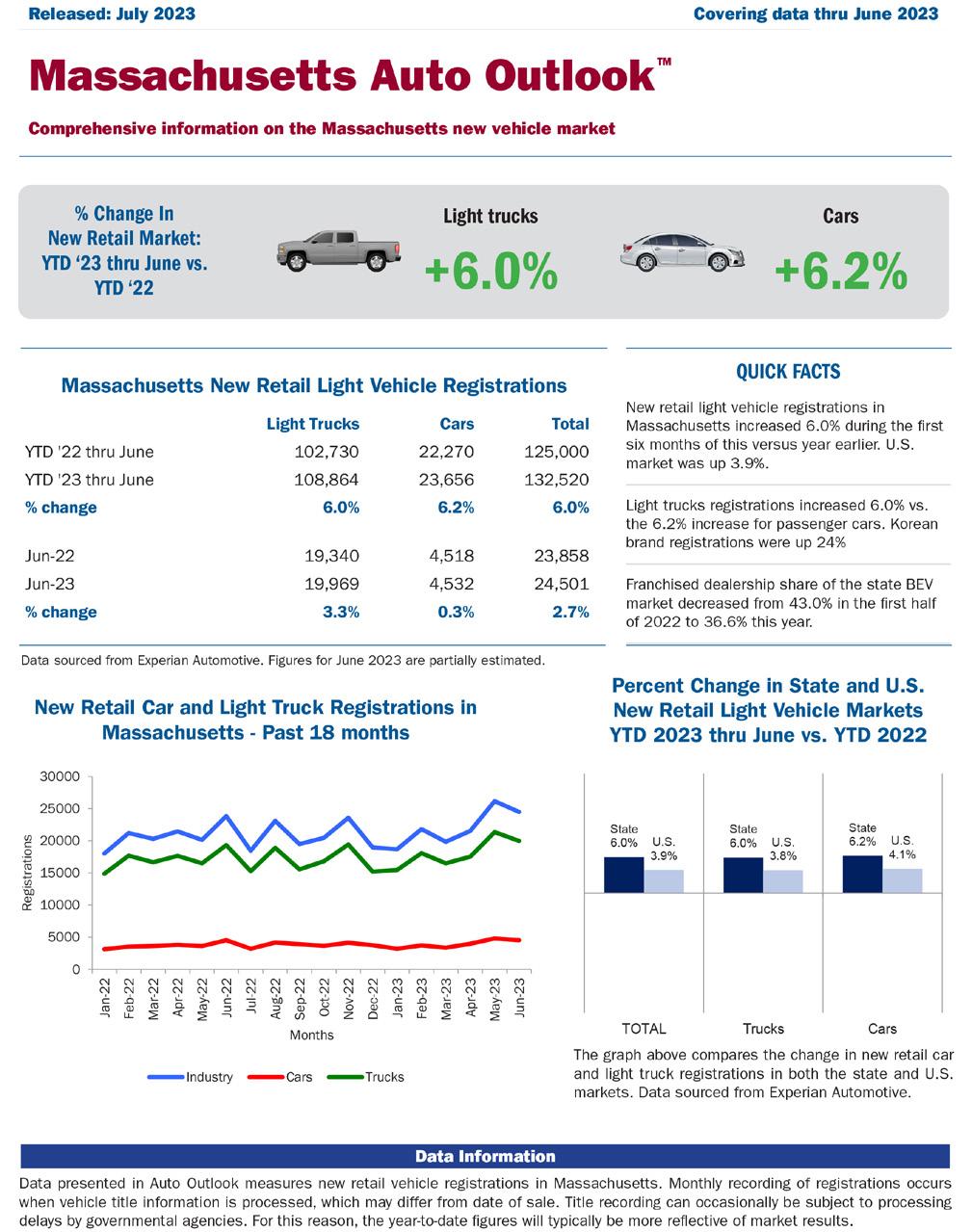

FEBRUARY 2022 Massachusetts Auto Dealer www.msada.org JUNE 2023 Massachusetts Auto Dealer www.msada.org 12 AUTO OUTLOOK
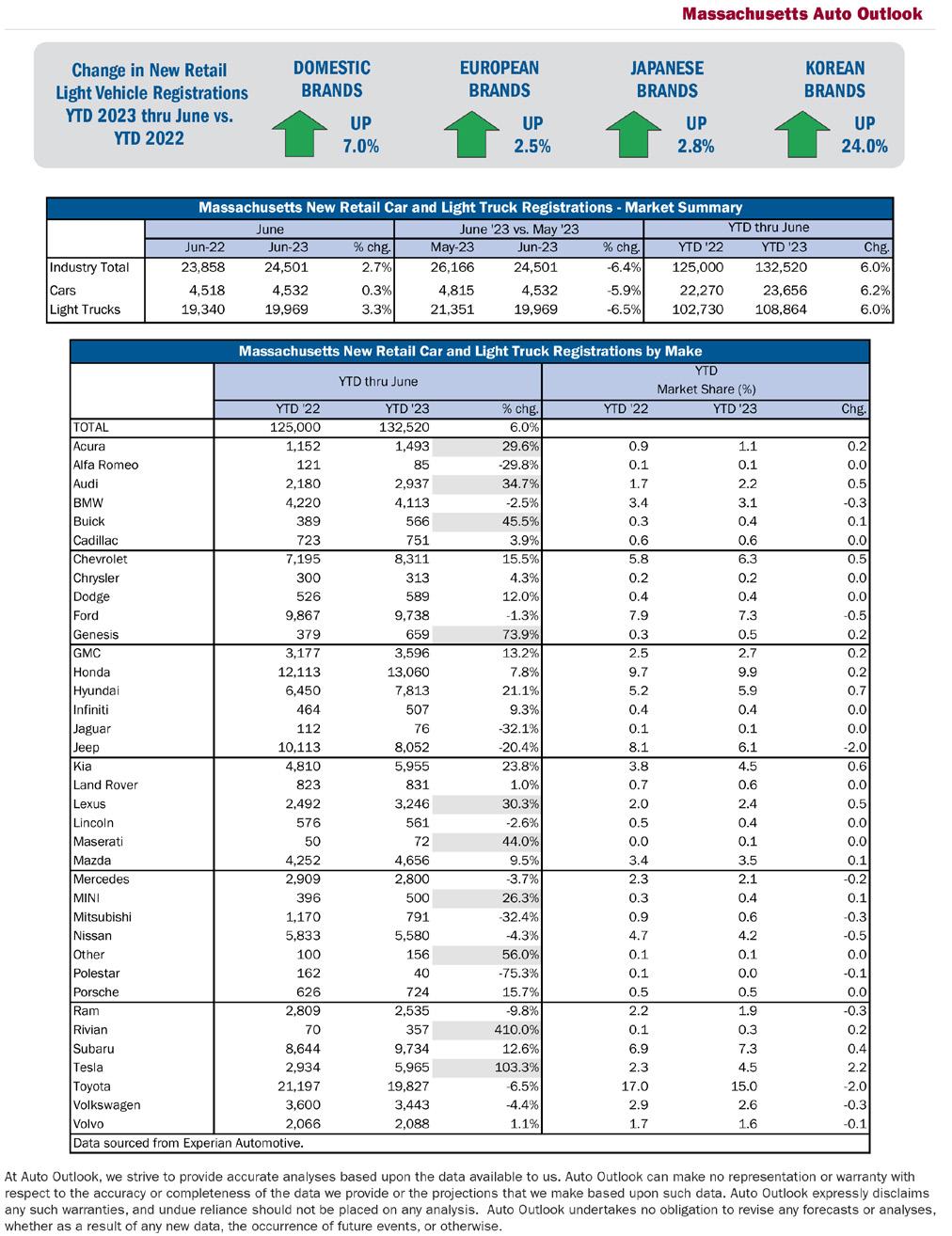
www.msada.org Massachusetts Auto Dealer FEBrUarY 2022 www.msada.org Massachusetts Auto Dealer JUNE 2023 MSADA 13
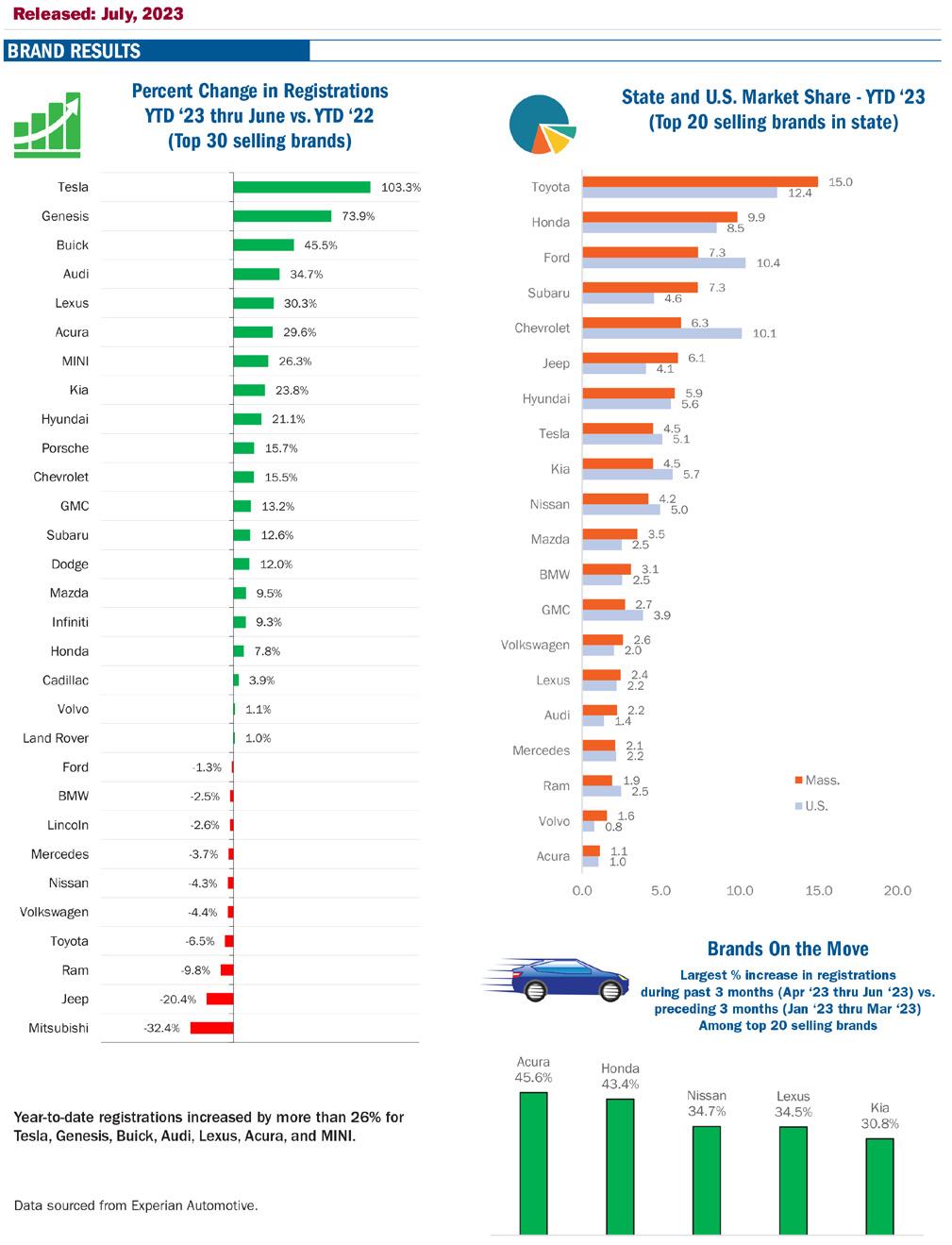

JUNE 2023 Massachusetts Auto Dealer www.msada.org 14 AUTO OUTLOOK
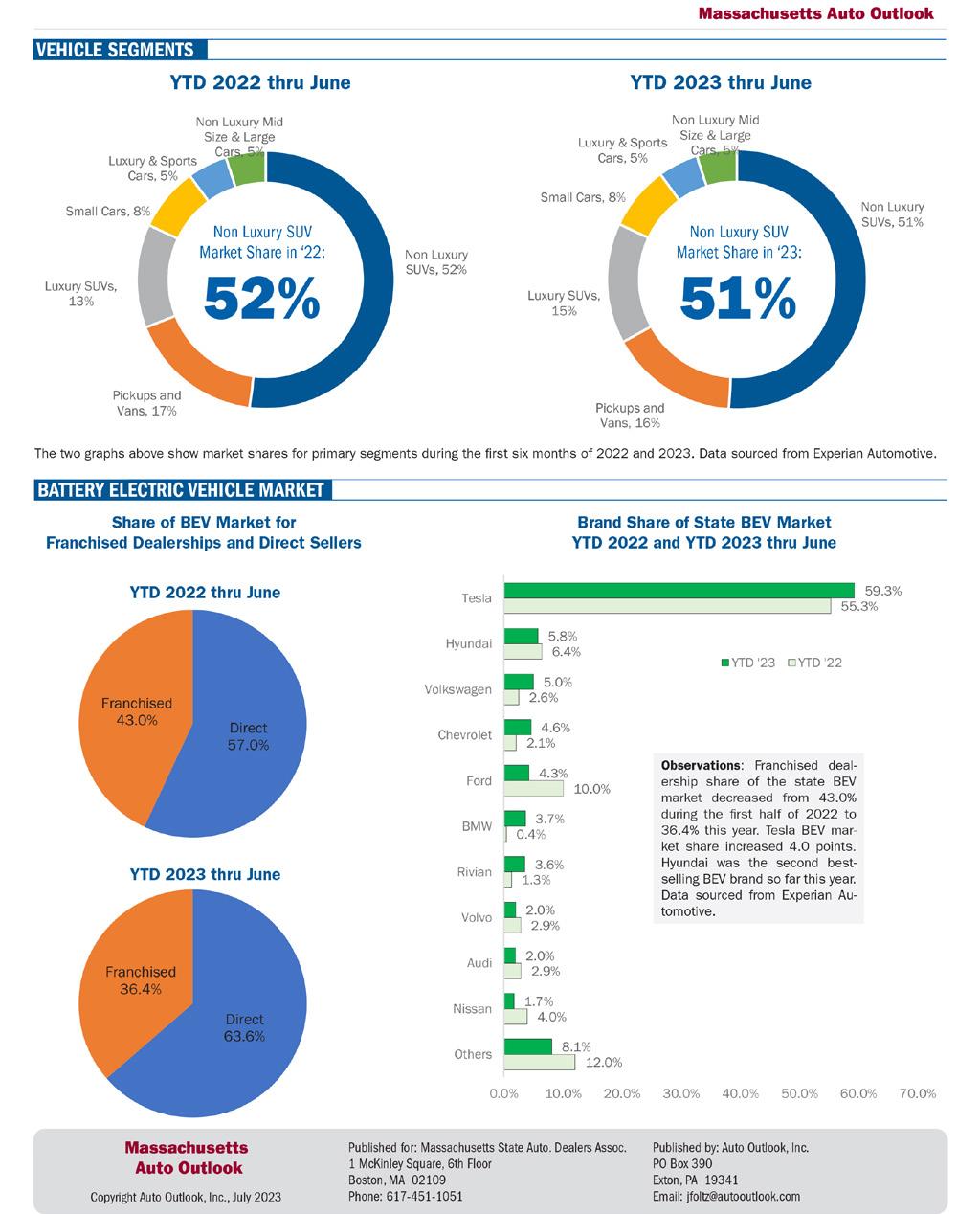
www.msada.org Massachusetts Auto Dealer JUNE 2023 MSADA 15
Our Federal Government Takes No Holiday

Dealers Urged to Participate in NADA Washington Conference
There is never a dull moment in Washington, D.C. Those who wield the levers of governmental power are always in motion looking for new laws to pass and regulations to approve to affect members of the business community, regardless of size and economic footprint. After all, those in Washington charged with doing the people’s business would not be attentive to their jobs, in their eyes, if they just sat around all day staring out their windows.
Who is in charge goes a long way to determine how far the pendulum of pain – or help – swings to and fro. Once the Biden administration with a Democratic Congress replaced the Trump administration, keen observers knew the pace of progressive government was going to pick up substantially, with the economy and the business community in its sights.
Long gone are the days when a Democratic administration respected the virtues of the market economy and the economic benefits it brought to the players, especially employees, and their families. Afterall, if there are going to be spending plans and social programs to smooth out the edges, government needs the revenues to do it. An economy on the ropes helps no one.
This is where groups such as the National Automobile Dealers Association (NADA), the American Truck Dealers (ATD) – a part of NADA, the American International Automobile Dealers Association (AIADA), and your Massachusetts State Automobile Dealers Association step in. Throughout the year – with events such as NADA’s Washington Conference, the ATD Forum, or AIADA’s Fly-In – they engage with the Members of Congress and regulators to confront matters impacting their dealerships and the automotive industry.
NADA Director Scott Dube points out all the time auto dealers have their work cut out for them as Congress continues to back measures that put businesses at risk.
“We can never stop putting effort into making sure our representatives know who we are, what we do, and how vital our contribution is to their districts and our communities,” Dube said. “We may not agree on every issue, but as we have seen proven during the past decade or so, when the chips are down the time put into establishing these relationships can really pay off. It is important to make our presence felt in Washington and through visits. More often than not, seeing is believing.”
“A substantial part of what MSADA does for our members is to stay in touch with our U.S. senators and representatives so that they know that what they are doing, or not doing, has an impact back home at our members’ dealerships,” said MSADA Executive Vice President Robert O’Koniewski. “Our engagement cannot be sporadic. Building relationships through constant communications can help to move policies in certain directions at times.”
JUNE 2023 Massachusetts Auto Dealer www.msada.org 16 COVER STORY
Six months into a new Congress split between a Republican House and a Democrat Senate, with the Biden administration working through the next two years toward a potential re-election campaign, the issues NADA and franchised dealers face are piling up.

“We have our annual NADA Washington Conference coming up in September,” stated Dube. “Many of the issues we are looking at today will be on our agenda. I urge dealers to join us in Washington on September 12-13 when we do our Congressional visits so we can keep our industry at the forefront of policy development.”
FTC Vehicle Shopping Rule
The big picture: The FTC’s proposed Vehicle Shopping Rule would drastically alter the entire process by which franchised dealers advertise and communicate with their customers and sell and finance new and used vehicles and voluntary protection products.
Changes that franchised dealers would have to make under
the proposed rule would inject massive amounts of time, cost, inefficiency, and complexity into the vehicle sales process at a time when the entire auto industry is united behind an effort to simplify and streamline vehicle sales, shorten transaction times, and improve the customer experience.
The FTC absolutely needs to go back to the drawing board before forcing implementation of a series of unstudied and untested mandates that will have significant negative impacts on customers.
What’s next: NADA is urging Congress to use its authority – including oversight and potentially budgetary authority – to highlight how fundamentally flawed the Vehicle Shopping Rule is.
Why it matters: There is bipartisan concern in both the House and Senate over the rule’s lack of evidence, questionable justification, and absence of consumer testing – as well as the FTC’s rush to judgment, failure to conduct any regulatory due diligence, and problematic testimony by the head of the agency, Lina Kahn. NADA is using all available resources to broadcast these concerns and amplify the message that the FTC needs to scrap this proposed rule and start over.
EPA Emissions Rulemakings

The big picture: NADA’s entire advocacy staff has been very active in response to the Biden Administration’s new and very aggressive emissions proposed rulemakings for new light-, medium- and heavy-duty vehicles, which were announced in April.
NADA continues to support the auto industry’s efforts to raise critical questions about the feasibility and impacts of such aggressive targets for EV adoption, remind stakeholders that dealers are ready and essential for any meaningful growth in EV adoption, and emphasize the need for others – beyond auto manufacturers and dealers – to step up and do much more themselves.
www.msada.org Massachusetts Auto Dealer JUNE 2023 MSADA MSADA 17
What’s next: In upcoming comments to the Administration – and ongoing public comments – NADA will explain everything that dealers are doing to get ready for widespread and mass-market EV adoption, including the $5 billion-plus in investments dealers are making in tools, training, and equipment necessary to facilitate a first-tier education, sales, and service experience for EV customers across the entire market and pricepoint spectrum.
NADA also will continue to explain that any meaningful growth in EV adoption will depend on a broad, unified strategy that considers the vital importance of consumer incentives, charging infrastructure, utility capacity, resources for battery manufacturing and the availability to consumers across the country of these newly-produced EVs themselves – just to name a few key factors.
Why it matters: America’s new-car dealers are doing their part on the road to electrification of our vehicle fleet. In addition to being ready, dealers are essential to the broad, mass-market adoption of the EVs that are now beginning to arrive in our showrooms. But others, including government at all levels, need to do their part as well.
Sale and Service of EVs
The big picture: Franchised dealers are ready for EVs and are essential to widespread consumer EV adoption.
What’s next: As the EV market enters the mainstream, EV customers will come to resemble the average car buyer more and more, and those mainstream customers are demanding that dealers play a central role in their transition to electric.
This is why the investments and commitments that dealers are making to prepare for EVs are so vital operationally, to OEM relationships, and politically.

Why it matters: Policymakers, opinion leaders, media outlets, many environmental groups, and other influencers continue to have difficulty accepting the reality that the franchised dealer network is a clear competitive advantage to selling both ICE vehicles and EVs.
EV Tax Credits
The big picture: The EV tax credits that took effect in 2023 as part of the Inflation Reduction Act are far from perfect. But NADA still believes that they are workable in the showroom and for customers. At the same time, it is important to continue down the positive path we’re on in terms of implementation. Policymakers should recognize any further narrowing of the credit, or anything that complicates a customer’s ability to easily understand how the credit works, is only going to limit its effectiveness as a pillar to more widespread EV adoption.
What’s next: NADA will continue working with Treasury and the IRS to address the numerous unresolved issues involved with the implementation of these credits. In addition, NADA will continue to educate dealers directly through the NADA compliance assistance webpage, webinars, and workshops – including at the 2023 NADA Show.
Why it matters: Dealers need to be viewed by customers, policymakers, automakers and the general public as helpful facilitators of available tax credits for the purchase of eligible new and used EVs.
LIFO Relief
The big picture: NADA is still working to see that Congress passes retroactive LIFO relief legislation. The “Supply Chain Disruptions Relief Act,” which provides identical relief to last year’s bill, has now garnered 60 cosponsors in the Senate, demonstrating that this legislation is not just overwhelmingly bipartisan, but also filibuster-proof. Work is continuing to grow the number of House bill cosponsors, which stood at 40 at the beginning of June.
What’s next: While challenges remain with passing this legislation, Congressional leaders have been supportive in securing additional cosponsors, especially in the House, which will help gain favorable consideration.
Why it matters: Many dealers – particularly smaller dealers – are still having difficulty replenishing vehicle inventories. And all dealers should remind Members of Congress that this
JUNE 2023 Massachusetts Auto Dealer www.msada.org 18 GOVERNMWNT TAKES NO HOLIDAY
is technical and noncontroversial legislation that would merely provide relief to these dealers whose inventories disappeared due to an unprecedented interruption of global supply chains.
Dealer-Assisted Financing
The big picture: Despite its clear benefits to consumers, government regulators continue to view dealer-assisted financing with skepticism. And the main focus of that skepticism is whether dealer participation is earned in a manner that violates anti-discrimination laws.
What’s next: NADA continues to promote and stress the importance of the optional NADA/NAMAD/AIADA Fair Credit Compliance Policy and Program as the optimal way to mitigate fair credit risk while maintaining the ability of dealers to discount financing, which is the hallmark of the beneficial nature of dealer-assisted financing to consumers.

Why it matters: The FTC, the CFPB, state attorneys general, and their many allies continue to bring forth investigations, examinations, and enforcement actions against franchised dealers and lenders – all rooted in allegations of discrimination or discriminatory outcomes in auto lending. These cases perpetuate the cycle of regulatory, media, and other stakeholder scrutiny.
Voluntary Protection Products (VPPs)
The big picture: Like with dealer-assisted financing, government regulators continue to express skepticism about VPPs – despite their demonstrated value and the favorable customer satisfaction scores they receive.
What’s new: VPPs are a prime target of the FTC’s Vehicle Shopping Rule. And VPPs are consistently part of enforcement actions alleging discrimination in the F&I office. However, earlier this year, the NADA Model Dealership Voluntary Protection Products Policy – a template policy to assist dealers in implementing a formal policy on the sale of VPPs – was incorporated into a settlement between Massachusetts and a dealership over allegations of price discrimination.
Why it matters: The Massachusetts case is the first instance of NADA’s VPP Policy being accepted as part of a settlement between a state government and a dealership. This demonstrates the broad recognition of the policy’s significant value – to dealerships and regulators – as an effective compliance template. It’s also why NADA highlighted the VPP Policy as a workable alternative to the very problematic provisions contained in the FTC’s Vehicle Shopping Rule.
Military Lending Act
The big picture: In April, the U.S. Court of Appeals for the Fourth Circuit upheld a federal district court decision holding
that a vehicle financing contract with a service member that includes GAP Waiver and other related costs remains part of the vehicle financing exclusion to the Military Lending Act (MLA).
This decision – at least in the Fourth Circuit, and potentially elsewhere – affirms the view that the financing of GAP Waiver does not trigger compliance with the MLA’s duties and restrictions.
What’s next: Regardless of the next steps that may be taken by the plaintiff (DOD) in this case or the government, NADA will continue to explain to courts and policymakers the significant value that VPPs can provide to consumers, and that Congress never intended for service members to be deprived of the opportunity to benefit from these protections.
Why it matters: NADA spent years seeking affirmation that dual purpose financing (financing of both a motor vehicle and related items such as GAP waiver) with a service member fits squarely within the motor vehicle financing exclusion of the MLA.
OEM Engagement
The big picture: NADA is focused like a laser on the obvious shift in the way many OEMs are speaking publicly about the retail process, as well as many of the changes being implemented between OEMs and their dealers. NADA also knows that, despite the fact that they have not been operationalized on a widespread basis, these ongoing references to direct sales, direct and exclusive sale of post-purchase vehicle services, the monopolization of the customer experience, or dealers as agents, etc., cannot realistically be seen by dealers, NADA or state associations as anything other than threats that go to the very core of the franchise system.
What’s next: NADA uses the regular Dealer Attitude Survey meetings, as well as constant engagement at the highest levels, to discuss these issues head on with OEM leaders.
Why it matters: OEMs we engage with appreciate that we are increasingly leaning in to the dealer-OEM relationship. Dealers appreciate the clarity that most OEMs have provided by publicly committing to their dealers and recognizing the competitive advantage dealers provide.
“The perception is that government does not really do anything, especially to help the folks back home on Main Street,” Opined O’Koniewski. “The reality is, if government does do something, we need to make sure that there is no absence of viewpoint from the franchised dealers. It is always particularly easy for a politician to vote a certain way if they never hear from the concerned parties. That is why our upcoming Congressional visits will be so vital. I urge our dealers to sign up and participate.”
www.msada.org Massachusetts Auto Dealer JUNE 2023 MSADA MSADA 19
t
NEWS from Around the h orn
HADLEY
TommyCar auto Group Carries on Their Commitment to academic Excellence
The Tom Cosenzi Scholarship Fund is proud to announce the recipients of its highly anticipated 2023 scholarship. The fund, established to honor the memory of Tom Cosenzi, continues its mission of empowering young individuals to pursue their dreams and achieve higher education.
Since its inception, the scholarship has awarded more than $18,000 to local students. The Tom Cosenzi Scholarship offers funds to graduating high school students who plan to attend a twoyear or four-year college, university, or trade school. The fund is open to two designated schools that are located in the communities where the Auto Group has dealerships: Hopkins Academy in Hadley and Northampton High School in Northampton.

The Tom Cosenzi Scholarship Fund proudly presents the following outstanding scholars:
Daisy Venditti of Hopkins Academy, a standout student from Hopkins Academy, has been accepted to the University of Massachusetts for the upcoming fall semester. Daisy’s exceptional leadership and unwavering dedication shine both on and off the sports field. She has been an integral part of her school’s basketball, softball, and soccer teams, showcasing her athletic prowess and commitment to teamwork. Beyond her involvement in sports and clubs, Daisy’s commitment to community service is truly remarkable. She has dedicated her time to chaperoning children’s activities for the Park and Recreation department, showing her genuine care and support for the younger members of her community. Daisy has also taken part in important initiatives such as the Montes March to end hunger, the Alzheimer’s walk, and a Ukraine dinner fundraiser, showcasing her dedication to making a positive impact on the lives of others.

Wesley Parent of Northampton High School, a distinguished student from Northampton High School, has been accepted to Worcester Polytechnic Institute for the upcoming academic year. Wesley’s exceptional leadership abilities were evident as he served as a varsity football captain, inspiring his teammates through his exemplary dedication and commitment. Wesley’s outstanding performance on the football field did not go unnoticed, as he received several accolades, including the
MSADA
title of Most Valuable Defensive Player, recognition as a member of the All-Western Mass Team, and being named a Super 7 player. Alongside his commitments on the field, he also took on multiple jobs, including a notable role as a Safety Village Counselor for the Northampton Recreation Department. In this capacity, Wesley played a crucial role in ensuring the safety and well-being of young children, making a positive impact by being a responsible role model for them.

The Tom Cosenzi Scholarship Fund extends its heartfelt congratulations to the 2023 scholarship winners and wishes them success in their future endeavors. Their unwavering dedication, passion, and commitment serve as an inspiration to all aspiring scholars. The fund remains committed to empowering young individuals and fostering a brighter future through education.
“I am incredibly honored to have the opportunity to give back to our community through the Tom Cosenzi Scholarship,” said Carla Cosenzi, President of TommyCar Auto and Founder of the Tom Cosenzi Scholarship. “I am privileged to play a part in their academic journey and look forward to seeing the remarkable contributions they will make to our society.”
For more information about the Tom Cosenzi Scholarship Fund and its scholarship recipients, please visit TomCosenziScholarship.com.
16
20
JUNE 2023 Massachusetts Auto Dealer www.msada.org
h
Gary rome to awards Holyoke High school student with Brand New Hyundai


Gary Rome, President & CEO of Gary Rome Hyundai, awarded one lucky Holyoke High School student with a brand new Hyundai Venue on May 31 at the dealership, located at 150 Whiting Farms Road in Holyoke. There were a total of 19 finalists given keys, and the one lucky keyholder, senior Mahaya Tabin, was awarded with the car. The parents and/or guardians of the finalists attended the event, as well as the principals, guidance counselors, teachers, school administrators, school superintendent, and Holyoke Mayor Joshua Garcia.

The Gary Rome Academic Achievement Award of a new Hyundai to a Holyoke High School Senior began in 2010. One deserving junior or senior at Holyoke High School is awarded with a new Hyundai vehicle each year from Gary Rome Hyundai. Gary works closely with the principal and guidance counselors to ensure this annual event is a success. The students that apply must maintain a minimum GPA of 3.0 or better and have fewer than six absences during the school year as well as no major disciplinary infractions. Each year, Gary and his team attend Holyoke High School North and Dean campuses for a pep rally to excite the students about the car giveaway.
“I feel strongly about empowering the youth of Holyoke and en-

couraging them to strive for excellence,” said Rome. “It’s important we give the youth of our city, something to be excited about.”
The winner, Mahaya Tabin, is a graduating senior, and she will attend Holyoke Community College in the Fall and major in Criminal Justice.
www.msada.org Massachusetts Auto Dealer JUNE 2023 21
HOLYOKE
NEWS from Around the
orn MSADA
Warranty Reimbursement –Post Pandemic
By Frank O’Brien
Just over three years after the government shutdown the economy due to the COVID-19 pandemic, the World Health Organization announced that the pandemic was over. Automotive dealers, some of the most resilient business owners in the country, navigated the pandemic, inventory supply issues caused by the microchip shortage, and workforce issues to generate record profits in 2021, 2022, and into 2023.
Now, as we head into the second half of 2023 and beyond, inventory levels (for most franchises) have started to build back up, and gross profits related to the sale of new and used cars have waned (albeit slightly). As this trend continues, the profits in the parts and service departments become increasingly important. However, rising costs, especially technician pay rates, have put a strain on those profits. Therefore, dealership management should focus on submitting for labor rate and parts markup increases annually.
Labor Submissions
The amended Massachusetts state franchise law, MGL Chapter 93B, permits dealers to submit for a labor increase once per calendar year. However, the average dealer waits 18 months to 2 years between submissions, sometimes longer. Meanwhile, the service department has lost incremental gross profits that cannot be recovered. Service directors should be

increasing the retail door rate annually and tweaking the labor grid at the same time. The dollar value of each year’s increase should be calculated based on the year-over-year increases in technician’s pay rates, other personnel costs, operating expenses, and overhead on a cost-per-labor hour basis.

• Rate Index Programs: Certain manufacturers (e.g., Ford Motor Company (Ford), BMW of North America (BMWNA), and Toyota Motor Sales (TMS)) will offer dealers an automatic annual warranty labor rate increase based on the consumer price index. The rate is often lower than the rate the dealer can obtain through a warranty labor rate submission through Chapter 93B or other
programs give the manufacturers carte blanche authority to lower the rate as they deem appropriate. We have seen instances in which the dealer’s final approved rate was significantly less than the repair order analysis, because the market rate survey included dealers that had not submitted for a labor rate increase in several years and/or were on a rate index program.
• Discounts: Manufacturers have always calculated the average rates net of discounts. However, we are starting to see certain manufacturers (General Motors, BMW, Audi of America, Porsche of North America) separating labor and parts discounts in their calculations. This could be problematic for those dealerships that take a 70/30 or 60/40 split when allocating labor and parts discounts. All discounts should be prorated based on the value of the labor and parts sold on the repair order.
states’ franchise laws. More importantly, the manufacturer locks the dealer into the program for a period of time (usually 3 years). Management should prepare an analysis to project the average retail labor rate prior to executing any OEM rate index programs.
• Manufacturer Labor Rate Submission Programs: Most manufacturers allow dealers to prepare a warranty labor submission that requires a combination of a repair order analysis (usually 20-30 qualifying repair orders) and a market labor rate survey. Unfortunately, these
• Maintenance Items: Chapter 93B provides a maintenance exclusion in the law but provides little detail as to what constitutes maintenance. Certain manufacturers (e.g., Ford, BWWNA, FCA-Stellantis, Subaru of America, Porsche of NA, Mazda North America, and Volvo Cars of North America) have taken a rather liberal interpretation of the maintenance exclusion and require dealers to include brakes, wiper blades, keys, batteries, and bulbs. These items are often discounted, which will reduce the rate. Additionally, Ford requires dealers to include all alignments, even those done in conjunction with a tire replacement or caused by outside influence. Management personnel for these franchises should ensure that these services are competitively priced but not overly discounted and that the hours paid to the technicians are not above industry benchmarks.
ACC ountin G 22 JUNE 2023 Massachusetts Auto Dealer www.msada.org
O’Connor & Drew + Withum
• Non-Warranty Like Repairs: BMWNA is notorious for including extended warranty repairs in the submission despite the repair being paid by a third party. To avoid these repairs from negatively impacting your rates, management personnel should code all extended and aftermarket warranty repairs as W for warranty. Additionally, BMWNA and Ford take an extremely liberal interpretation of damage. Oftentimes, these manufacturers include repairs that were caused by some type of outside influence. While there is not much recourse for the dealer in this area, dealers should be aware of this tactic to take steps to maximize their results.
• Diagnostic: Certain manufacturers (General Motors, BMWNA, FCA-Stellantis, Porsche of NA, Volkswagen of America) include all diagnostic charges, including those for which the customer declines the repair. As a result, it is critical to bill all diagnostic lines at your retail door. Discounting this line would have a negative impact on your average rate.
Parts Submissions
While annual parts submissions are not common, multiple submissions are starting to become more frequent. We have a number of dealerships (various franchises) that have submitted for warranty parts increases more than once and now have approved warranty parts markups over 100% with some over 120%. Oftentimes, increasing your warranty parts markup from 75% to over 100% will increase gross profit by thousands of dollars a month. Dealers looking to achieve similar numbers should analyze and adjust their parts price matrices to build more profit into the most frequent mechanical repairs. We have an interactive tool to help dealers do that.
• Toyota and Mercedes-Benz: After years of push back and reluctance from Toyota Motor Sales (TMS) and Mercedes-Benz of USA (MBUSA), we have successfully assisted several Massachusetts Toyota dealers obtain retail rates for warranty parts. Additionally, we have assisted Mer-

cedes-Benz dealers in other states with similar laws to Massachusetts.
• Buy/Sell Transactions: Additionally, it is important to note that most manufacturers reset the warranty parts rate to 40% or MSRP after a buy/sell. This requires the new dealer to submit for a warranty parts rate increase to retail. Certain manufacturers will claim that a submission cannot be made in the first year, but that is simply not true. A warranty reimbursement submission (parts or labor) can be submitted under Chapter 93B any time after the closing date. However, the dealership will need to accumulate enough data to submit 100 qualifying repair orders (usually within 60 days).
If you have any questions regarding these issues or any other issues pertaining to the warranty reimbursement process, please contact Frank O’Brien, CPA, CIA, CFE at (339) 255-5358 or frank.obrien@ withum.com.
23 MSADA www.msada.org Massachusetts Auto Dealer JUNE 2023
t
Putting the ‘Tax’ Back in Taxachusetts
By Mike Cronin
O’Connor & Drew + Withum
High Profits and ‘Low’ Taxes
By now, everyone with knowledge of the auto industry is aware of the record-breaking profits that have been taking place across the country for the past few years. What few have realized is that this has also come at a time of historically low taxes. Yes, it may be hard to believe that the significant individual income taxes that auto dealers have been paying can be considered ‘low.’ Still, the driver of increased taxes over this timeframe is due to increased income and not the relatively low tax rate.
The Tax Cuts and Jobs Act of 2017 reduced the maximum individual tax rate from 39.6% to 37%. But much more importantly for small business owners, it allowed a 20% of Qualified Business Income (QBI) deduction. This resulted in an effective federal rate on dealership income of 29.6% (20% from 37%) if derived from a pass-through entity – think S-Corporation or Partnership. The lowest top federal tax rate has not been below 30% in the past thirty-plus years. When combined with the Massachusetts state income tax of 5%, most Massachusetts dealerships’ and related real estate incomes were being taxed at a collective 34.6% at the individual level.
Massachusetts Taxes
Contrary to popular belief, Massachusetts and its voters did not always increase taxes for its constituents. In November 2000, the Massachusetts voters successfully passed a reduction to the state income tax from 5.85% to a flat 5%. Then in September 2021, the Massachusetts Legislature enacted an elective pass-through entity (PTE) tax to provide pass-through entities with the ability to deduct state taxes at the federal level while passing the credit to the
individual owners. The PTE election resulted in an approximately 1% decrease in total individual taxes to owners of pass-through entities, bringing the total tax noted above down from 34.6% to 33.6%. And finally, in November 2022, refunds on personal income tax liabilities were paid due to excess tax revenue collections set by Chapter 62F of the Massachusetts General Laws.
However, the state tax landscape changed in November 2022, when Massachusetts voters passed a law that imposes an additional 4% personal income tax for its high-income earners, referred to as the “millionaires tax.” The result is that every dollar of taxable income over the initial $1 million threshold will be taxed at 9% starting with the 2023 tax year. This means that every dollar over the first $1 million from your Massachusetts dealerships and real estate pass-throughs will be taxed at a combined 38.6% instead of 34.6%. This is an additional $40,000 in taxes per million dollars over the income threshold.
Minimizing the 4% Impact
With the dealership market remaining strong in 2023, there may not be a way to avoid this additional tax entirely, but there are some ways to mitigate the impact.
• Filing Separately: For numerous tax instances, there are benefits to being married and filing a joint return. This is not one of them. The $1 million threshold is the same for both single and joint tax returns. Therefore, if both you and your spouse have substantial taxable income, under current law you could file separately in Massachusetts (while still filing jointly federally) and reduce the burden of the 4% tax. If you both happen to make over $1 million, then this is a way to shelter an additional $1 million of income or $40,000 in state taxes. (Note: The Legislature presently is deliberating an amendment to the law to eliminate this loophole.)
• Selling Assets: If you are planning to sell an asset or group of assets in 2023 or going forward, you might want to consider setting up the sale as an Installment Sale, where you receive the proceeds
over time. In this case, you would also defer the associated gain. Spreading the income for multiple years could reduce or eliminate the impact of the 4% tax.
• Moving Out of Massachusetts: As taxes increase and more work is done remotely, many Massachusetts taxpayers are looking to relocate to low- or no-income tax states. However, a non-resident taxpayer would still be taxed on the income derived from Massachusetts, including your in-state auto dealership.

Tax Day 2024
Even if you can take advantage of these planning ideas, based on the significant profitability in the auto industry that looks to continue throughout 2023, you will likely have at least a portion of your income over the $1 million threshold. And this extra tax money will likely be coming out of your pocket in April 2024. Most auto dealers will be ‘safe-harbored’ on their federal and state income tax estimated payments, meaning they will pay in tax estimates during 2023 based on 2022 tax amounts. However, 2022 did not include the additional 4% millionaires tax, so, likely, this amount will not have been paid in by the time your tax return comes due. Remember this during the year so there are no surprises at the tax deadline.
On top of that, dealerships that are set up as S-Corps or Partnerships have been taking advantage of the Massachusetts PTE tax, which results in the dealership paying the Massachusetts taxes on behalf of their owners. The problem is that the Massachusetts PTE tax is a 5% tax and does not consider the additional 4%. The additional 4% cannot be taken as a deduction the same way the initial 5% tax is currently, and the owners will be responsible for the additional 4%.
To summarize, if your taxable income for 2023 is expected to be on pace with or greater than 2022’s and you will make over $1 million, then you should expect to be writing the Commonwealth a check next April – and you will have the voters of Taxachusetts to thank for it.
24 JUNE 2023 Massachusetts Auto Dealer www.msada.org MSADA MSADA ACC ountin G
t
Buyer Beware – OEMs Increasingly Exercising Their Rights of First Refusal
By Tom Vangel & James Radke
Over the past several years, auto dealers across the country have experienced a rather robust buy/sell market. Manufacturers who previously sat on the sidelines and approved proposed buyers are now taking more of an interest in who the ultimate buyer of the dealership will be. Consequently, manufacturers of various line-makes have been electing to exercise their right of first refusal (ROFR) to appoint their favored candidate in lieu of the proposed buyer. Sometimes, where there are competing offers for the dealership, a disgruntled runner-up is able to convince the manufacturer to exercise the ROFR and appoint him instead of the proposed buyer. In other situations, the manufacturer may wish to appoint a minority dealer for a particular location, or it may prefer another candidate who operates other points for the manufacturer.
What does this mean for the proposed buyer? Unfortunately, under Massachusetts General Laws Chapter 93B, which governs the relationships between automotive manufacturers, distributors, and dealers, proposed buyers do not have legal standing to sue the manufacturer for the wrongful exercise of its ROFR. This is consistent with most automotive laws across the country.
This issue of standing was first decided in Massachusetts in 1985 in the case of Beard v. Toyota, which presented an unusual set of circumstances. In that case, approximately six weeks after the selling dealer signed a purchase and sale agree-
ment for his Toyota dealership, he received a better offer for an additional $50,000. The seller convinced Toyota that it should not approve his original proposed buyer, allowing him to accept the higher offer. After receiving notice that Toyota had declined to approve his application, the original proposed buyer sued Toyota for wrongfully withholding its approval.
The Massachusetts Supreme Judicial Court (SJC) determined that the Legislature’s intent in enacting Chapter 93B was to protect motor vehicle franchisees and dealers from “the type of injury to which they have been susceptible by virtue of the inequality of their bargaining power and that of the affiliated manufacturers and distributors.” In other words, the law was intended to protect a Ford dealer, for example, from the unfair and oppressive actions of Ford; it was not intended to protect an unaffiliated buyer from the actions of the manufacturer. Thus, while the circumstances of the Beard case are unlikely to occur with any frequency - with a seller convincing the manufacturer to reject his own buyer - the case established the law in Massachusetts for the past 38 years.
In 2014, the SJC affirmed the principles of the Beard decision in litigation brought against Tesla arising from its direct sales model, finding that only a franchised Tesla dealer (of which there were none) or the Attorney General would have standing to sue Tesla for its direct-to-consumer model. Accordingly, the law in Massachusetts is clear that, unless the selling dealer is willing to object to the manufacturer’s exercise of its ROFR, the proposed buyer will have no standing to mount a legal challenge to the decision to appoint a favored candidate over an otherwise qualified prospective buyer.
Typically, selling dealers are agnostic concerning the identity of the successor franchisee, since the manufacturer’s exercise of the ROFR requires the new buyer to match every term in the asset purchase
agreement and the real estate purchase and sale agreement, including due diligence periods, satisfaction of financing contingencies or lack thereof, and, most importantly, the purchase price and timing of the closing. The buyer appointed by the factory must close on the exact same terms as set forth in the agreements. Consequently, the selling dealer is not at all negatively impacted by the factory’s exercise of the ROFR and is usually just as happy to close with a different buyer. This is particularly true if there is any risk that the manufacturer may not approve the original buyer for legitimate reasons.
The consolation prize for the jilted buyer is that his legal and other out-of-pocket expenses associated with attempting to purchase the dealership must be reimbursed by either the manufacturer or its appointed buyer. A jilted buyer should not be bashful in calculating all of his expenses. Although typically reimbursement is only sought for actual out of pocket expenses for attorneys, accountants, environmental consultants, appraisers, and the like, the statute does not specifically preclude a dealer principal from seeking reimbursement for his lost time associated with pursuing the transaction. A buyer should include that as an eligible expense in the asset purchase agreement with a corresponding hourly rate.
Lastly, it should be noted that certain insider transactions are exempt from the manufacturer’s ROFR. Manufacturers are not permitted to exercise a ROFR over a sale to a co-owner of a dealership, a member of dealership management who was previously approved by the manufacturer as a manager, or an immediate family member of the dealer or co-owner.
Tom Vangel and Jamie Radke are partners with the law firm Murtha Cullina LLP in Boston who specialize in automotive law. They can be reached at 617-457-4072.


www.msada.org Massachusetts Auto Dealer JUNE 2023 25 MSADA L e GAL
t
Partners at Murtha Cullina LLP, (617) 457-4072
Strong new light-vehicle sales last month helped end the first half of the year on a high note. The June 2023 SAAR totaled 15.7 million units, an increase of 20.2% compared with the June 2022 SAAR. Raw sales volume in June 2023 was 1.37 million units, raising total sales volume for the first half of the year to 7.66 million units—up 13% compared with the first half of 2022. According to Wards intelligence, fleet sales were 18% of June 2023 volume, up from 16% in June 2022. Wards estimates that retail sales increased 7.6% year-over-year the first half of 2023, while fleet sales increased 45% over the same period.
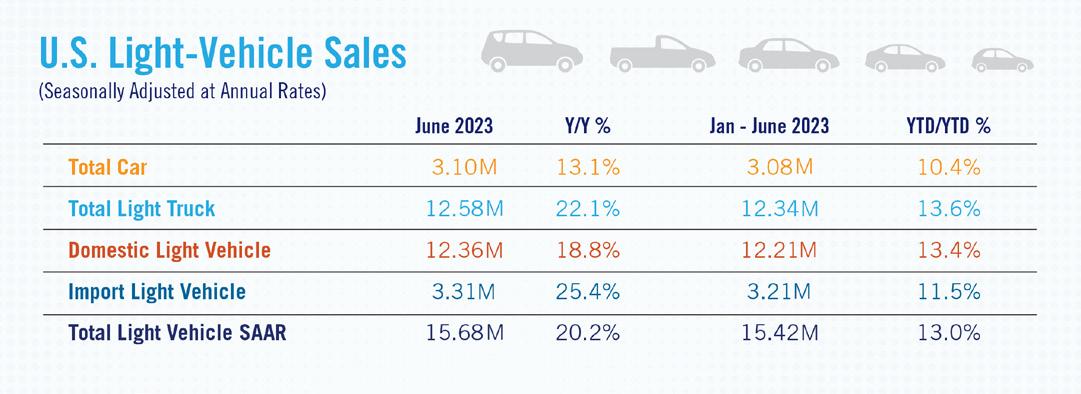
Alternative fuel vehicles gained market share the first half of the year with sales of battery electric vehicles (BEVs), plug-in hybrids and hybrids comprising 15.4% of all new light vehicles sold. BEVs alone represented 6.9% of all new light-vehicle sales, up from 4.9% of sales the first half of 2022. Crossovers — at 46.6% of all new light-vehicles sold during the first half of the year — remained the most popular segment.
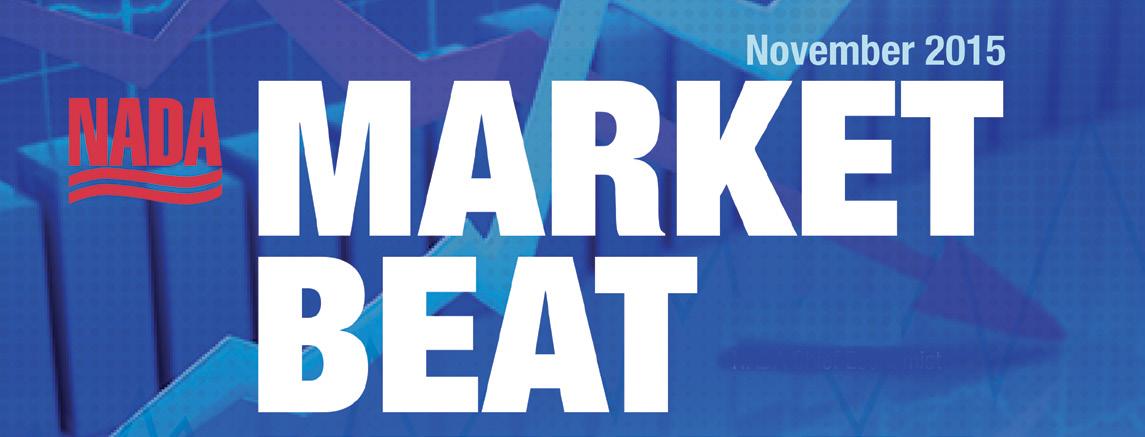
Improving new-vehicle availability helped drive the sales increases. New light-vehicle inventory on the ground and in-transit totaled 1.81 million units at the start of June 2023. We expect
month-end inventory for June 2023 will increase slightly compared to the beginning of the month. Manufacturer incentive spending has increased incrementally as inventory has improved. According to J.D. Power, average incentive spending per unit is expected to total $1,798 in June 2023, up only slightly compared with May 2023 but a significant 95.9% increase compared with June 2022. J.D. Power also notes that leasing discounts have improved in recent months. In June 2023 leasing should account for 21% of new-vehicle retail sales, an improvement from the low of 16% in September 2022 but still below the pre-pandemic lease penetration of 30% in June 2019.
After a pause at its June meeting, the Fed has signaled it will increase the Fed Funds Rate further in coming months. These higher rates will be a headwind for new-vehicle sales. But there is still pent-up demand from retail and fleet customers, and high used-vehicle values will help consumers with their trade-in values. We expect new light-vehicle sales in the second half of the year to be similar to the first half. As a result, we have increased our overall 2023 forecast to 15.2 million units.
JUNE 2023 Massachusetts Auto Dealer www.msada.org 26
t APriL 2023
Patrick Manzi NADA Senior Economist Boyi Xu Economist
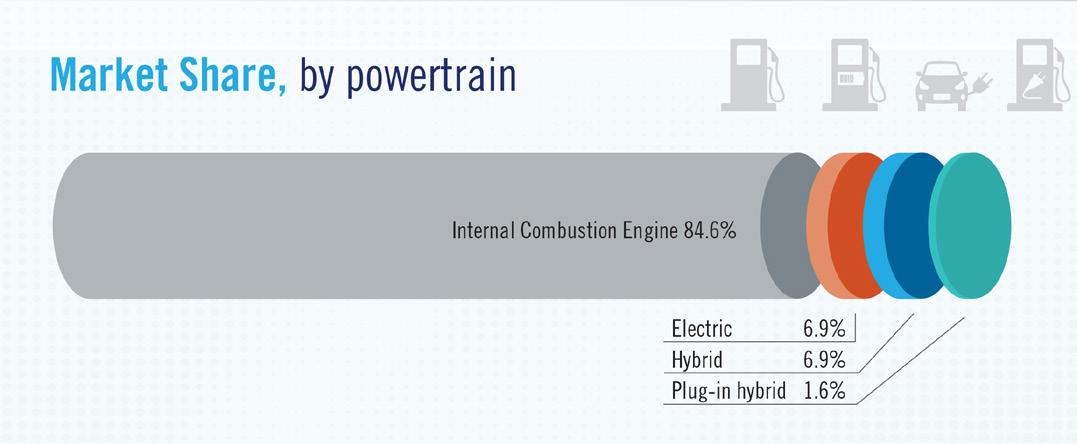
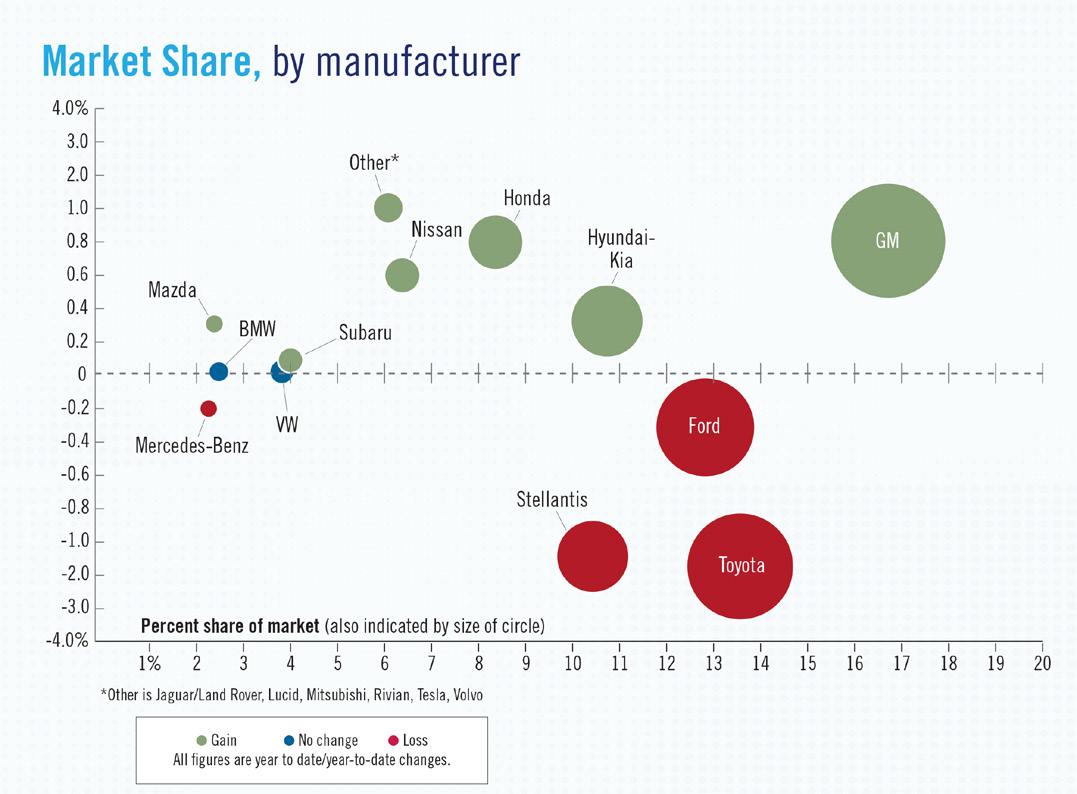
www.msada.org Massachusetts Auto Dealer JUNE 2023 27 MSADA MA r K et B e At
Electric Vehicle Push Sparks Global Trade Tensions
By Cody Lusk President & CEO, American International Auto Dealers Association

The federal government’s plan to dramatically expand electric vehicles adoption in the United States remains clear as mud here in Washington, D.C., and so it is no surprise that our government’s bewildering and sometimes conflicting approach to green vehicles is sparking concerns abroad.
First, some provisions in last year’s massive Inflation Reduction Act (IRA) spending bill are so blatantly protectionist of domestic electric vehicle production that they have all but forced foreign governments, including some of our closest allies, to threaten reprisals. For example, only vehicles assembled in countries that have existing free trade agreements with the United States are eligible to be included in the EV tax credit program. Currently excluded are the European Union and its 27 member countries and the United Kingdom, just to name a few. In a late attempt to remedy this issue, Katherine Tai, the United States Trade Representative is negotiating smaller, sector specific agreements with other countries to address these concerns.
The global impact of the IRA does not end there. Next year, a provision will go into effect disqualifying any vehicle from the credit if any of its battery components come from a foreign entity of concern (i.e., China or Russia). In 2025, a vehicle can also be ineligible for the credit if any of the critical minerals come from a foreign entity of concern. As there is currently only one active lithium mine in the United States,
industry experts anticipate that this will be a real challenge for manufacturers and suppliers.
So how are world leaders responding to Congress’ exclusionary EV tax credits? About as well as you might expect. Earlier this month, French President Emmanuel Macron announced that France will establish measures aimed at promoting EV purchases and exclusively benefitting European manufacturers by the end of this year, and he called on other EU leaders to do the same. Meanwhile, the European Commission, along with South Korea, Japan, and China, has taken its concerns over the United States’ green subsidies to the
to increasing EV adoption, and we have to ensure that our elected officials understand just how price sensitive the average American customer is when it comes to car shopping.
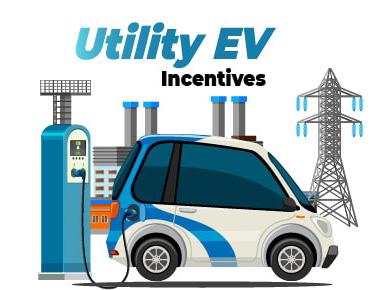
World Trade Organization, arguing that the current policies unlawfully disadvantage international auto manufacturers.
What can dealers do to ensure that their brands and products do not get left out in the cold by the IRA? One of the most impactful measures you can take is to communicate directly with your elected representatives in Washington, D.C. They need to understand just how important it is to make all EVs affordable if the government is serious about its new goal of going from 5.8 percent EV sales to 67 percent in less than a decade. Affordability is one of the most challenging factors when it comes
Currently, there are over 90 clean vehicles on the market but only 23 qualify for at least part of the Clean Vehicle Tax Credit. As of this writing, the Volkswagen ID.4 is the only international nameplate brand electric vehicle currently eligible for a tax credit. That is not nearly enough to spark a nationwide EV revolution. Remember: EVs are significantly more expensive than their gas-powered alternatives. If the government is serious about expanding EV adoption, they need to be willing to work with our global allies and make sure that EV tax credits are fairly, and widely, applied. Congress also needs to take action on expanding and strengthening America’s charging infrastructure and the electric grid that underpins it. S&P Global Mobility estimates that by 2030, with the assumption of 28.3 million EV units on US roads, about 2.13 million Level 2 and 172,000 Level 3 public chargers will need to be built – all in addition to the units that consumers put in their own garages. Without widely available and functional chargers, electric vehicles are not going anywhere, and Americans will not be buying them.
As we neared the June 5 debt crisis deadline, all eyes in D.C. and beyond were focused on resolving the increase in the national debt limit cap. But that does not mean that dealers cannot be focused on equally important issues and act as proactive advocates for their businesses. Let AIADA help you set up a dealer visit with your Member of Congress today and have them come to your store to see first-hand the challenges, and rewards, of selling electric vehicles. To get started, just go to AIADA.org/visit and let us get to work on your behalf.
MSADA 28 JUNE 2023 Massachusetts Auto Dealer www.msada.org MSADA A i A d A Brie F
t
By Scott McCandless
Chairman, American Truck Dealers
ATD’s Truck Industry Forum and Legislative Fly-In: What You Missed

In mid-June, the American Truck Dealers (ATD) hosted a packed house for the 2023 Truck Industry Forum. The sold-out event addressed the industry’s most pressing issues before sending truck dealers to Capitol Hill to hold nearly 100 meetings with Members of Congress to advocate for truck dealer legislative priorities.
Issues on the agenda included the Environmental Protection Agency’s (EPA) recently proposed Phase 3 greenhouse gas emissions (GHG) standards for heavy-duty vehicles, the EPA’s heavy-duty low-NOx rule, repealing the federal excise tax (FET) on heavy-duty tractors and trailers, and catalytic converter anti-theft legislation.
While the trucking industry supports reducing emissions and putting cleaner and greener vehicles on the road, the EPA’s proposed regulations mandate stringent electric adoption targets and timelines that could slow down rather than accelerate electric vehicle investments. Much of the presentations at the Forum focused on federal regulatory and legislative advocacy efforts to address this important issue.
The hot topic: “We are committed to the transition to a zero-emission future. For this to be successful, the aggressive deployment of zero emission trucks has to be matched by an equal focus on establishing the necessary infrastructure, support network and supply chain,” said Carl Hergart from PACCAR.
The future of electrification: “The reality is it’s a big challenge,” said Paul Rosa from Penske, citing range, cost, time, weight, and charging infrastructure as the biggest challenges facing EV adoption. Panelists speaking about electric commercial vehicles discussed the obstacles to customer adoption and how the regulatory landscape is at odds with a realistic timeline.
Advice from the electric utility companies: “Ask the customer if they have a charging strategy. The infrastructure really matters. Your charging strategy will affect your capital cost and your operational cost,” said Kellen Schefter from the Edison Electric Institute, which represents the investor-owned utility
companies that provide 70 percent of the electric usage in the U.S.
Economic outlook: Trucking expert Avery Vise from FTR Transportation Intelligence described consumer spending on goods as “solid,” which creates a healthy demand for trucking equipment.
Though still inconsistent, the supply chain is improving with the Class 8 backlog below 200,000 for the first time since 2020. The backlog to build ratio, which indicates the industry lead time on inventory, is at 6.8 months, also its lowest since 2020.
Call to action: “Our future depends on our ability to get engaged and shape outcomes,” said Chris Spear, president and CEO of the American Trucking Associations, before the dealers travelled to Capitol Hill to meet with their legislators. “The most important thing that you can do is make an ask. You are the heartbeat of the country’s economy. This industry is essential.”
From Capitol Hill: There is bipartisan support for our trucking priorities in Congress. Rep. Mike Collins (R-Ga.), who proudly holds the title of the only trucker in Congress, came to the Forum to address the attendees. Rep. Collins grew his Georgia trucking business from just one semi-truck to a fleet of 115, and now is educating other members of Congress and government agencies on the trucking industry. Rep. Nancy Mace (R-S.C.) also addressed the Forum, emphasizing the need to invest wisely in infrastructure and provide oversight to the agencies that regulate the industry, including the EPA.
ATD Chairman Scott McCandless was energized by the day of “open dialogue…about what it takes to move our great industry forward.”
“We need to work with one another to find solutions,” McCandless said.
Thank you to the 2023 ATD Forum Platinum sponsors: [platinum level] BMO, CDK Global, Daimler Truck, Isuzu, International, Mack, and Procede Software, and [gold level] Cummins, Hino, Interstate Billing, KEA Advisors, Kenworth, and Peterbilt.
W
t www.msada.org Massachusetts Auto Dealer JUNE 2023 29
Scott MccandleSS iS preSident of MccandleSS truck center in aurora, colorado, and a truck induStry veteran with 40-pluS yearS of experience
tru CK C orner MSADA
“the EPA’s proposed regulations mandate stringent electric adoption targets and timelines that could slow down rather than accelerate electric vehicle investments”
Washington Conference on the Horizon
According to the National Insurance Crime Bureau, thefts increased by 1,215% between 2019 and 2022. Due to valuable precious metals used in the devices, stolen catalytic converters can garner anywhere from $20 to $350 on the black market; however, the replacement cost to vehicle owners can be as high as $2,500. At present, thefts are hard to combat as catalytic converters are not easily traceable and can be stolen from unattended vehicles in mass quantities, including at dealership lots.
We at NADA have a robust legislative and regulatory agenda before us. See this month’s cover story for more details. As the Biden administration pursues anti-business regulations that will substantially harm our franchised dealer members, please keep in mind that our legislators down in D.C. do not operate in a vacuum. You can always help in our advocacy efforts by hosting a Member of Congress at your dealership, or making a phone call to your congressman, or even flying to D.C. for two days in September for our Washington Conference. Every little bit can help. Please contact me if you want to get more involved.
NADA, Broad Coalition Push Congress to Act on Catalytic Converter Theft Bills
The National Automobile Dealers Association, joined by 20 industry partners, sent a letter last month to the leaders of the U.S. House and Senate Commerce Committees in support of H.R. 621/S. 154, a bipartisan bill to combat rising catalytic convertor theft. The “Preventing Auto Recycling Theft (PART) Act” addresses the growing national problem of catalytic converter thefts, which are costing businesses and vehicle owners millions of dollars annually.
America’s franchised car dealers commend Sens. Amy Klobuchar (D-Minnesota), Mike Braun (R-Indiana), Ron Wyden (D-Oregon), and JD Vance (R-Ohio) for introducing the Senate bill and Reps. Jim Baird (R-Indiana), Betty McCollum (D-Minnesota), Angie Craig (D-Minnesota), Randy Feenstra (R-Iowa), and Michael Guest (R-Mississippi) for reintroducing the House companion bill.

“Catalytic converter theft continues to rise across the country, with no clear end in sight,” said NADA President and CEO Mike Stanton. “Common sense legislation like the PART Act would help give law enforcement the tools they need to deter catalytic converter thefts.”
The PART Act would give local law enforcement additional resources to prosecute thieves by requiring new vehicles to have traceable numbers stamped on the catalytic converter during assembly. The bill also increases record keeping requirements for purchasers and establishes a federal criminal penalty for theft, sale, trafficking, or known purchase of stolen catalytic converters of up to five years in jail. The organizations who have signed the letter urge Congress to pass this legislation that provides a federal framework needed for local law enforcement to combat catalytic converter thefts.
Signers of the letter includes such groups as National Automobile Dealers Association; American Car Rental Association; American Property Casualty Insurance Association; American Rental Association; American Truck Dealers; American Trucking Associations; Automotive Recyclers Association; Elite Catering & Event Professionals; Major Cities Chiefs Association; NAFA Fleet Management Association; National Association of EMTs; National Auto Auction Association; National Automatic Merchandising Association; National Consumers League; National Insurance Crime Bureau; National Private Truck Council; National RV Dealers Association; National Salvage Vehicle Reporting Program; National Tank Truck Carriers; NTEA — The Association for the Work Truck Industry; Truck Renting and Leasing Association.
Electric Car Sales Growth Slows in U.S.
as Inventory Builds Up
(Source: Bloomberg News)
Electric vehicle sales growth, while still brisk, has begun to slow in the US as inventory of battery-powered models piles up on dealer lots.
Sales of plug-in models grew by nearly 50% in the first half of the year, according to data from researcher Motor Intelligence. That’s less than the 65% growth rate for all of 2022 and well off the 71% gain in the first half of last year over the same period in 2021.
n A d A u pdate By Scott
Dube
30 JUNE 2023 Massachusetts Auto Dealer www.msada.org MSADA
Scott Dube, Partner at McGovern HyunDai rt. 93, rePreSentS naDa’S MaSSacHuSettS MeMberS on tHe naDa boarD of DirectorS. He can be reacHeD at SDube@ McGovernauto.coM.
The slower pace comes as the supply of EVs on dealer lots ballooned to 92 days in June, well above the 51 days of inventory for all models, according to researcher Cox Automotive. That may help explain why only 31% of dealers see EVs as the future, while 53% of car buyers do, according to a survey Cox conducted.
“Dealers, staring at almost 100 days’ supply, perhaps are a bit more realistic,” said Mark Schirmer, a Cox spokesman. “The extra inventory is making some dealers a bit concerned.”
Automakers are pouring $200 billion into constructing nearly 100 EV assembly and battery plants in the United States in the biggest build-up since the industry was founded more than a century ago, according to consultant KPMG.
Consumer acceptance in the US has been slower than in China and Europe, as American car buyers have balked at high prices and spotty charging infrastructure.
But legacy and startup automakers are betting their futures on catching up with Tesla Inc., which generates profit margins twice the going rate in the industry while controlling 60% of the US EV market. Wall Street is skeptical of EV growth ambitions such as Ford Motor Co.’s plan to boost output of battery powered models by more than 15-fold to 2 million vehicles a year by the end of 2026.
Car Prices Ease as Pandemic Supply-Chain Issues Fade
(Source: Bloomberg News)
The US new-car market is returning to pre-pandemic norms as supply-chain issues resolve, forcing carmakers to ramp up deals to sustain sales growth.
The annual pace of new-car sales likely rose to 15.6 million in June, from 13 million a year ago, according to the average forecast of seven market researchers. Cox Automotive raised its full-year forecast to 15 million, from 14.2 million in March, as deliveries to businesses and rental-car companies, which evaporated during pandemic scarcity, rebounded.
“Pent-up demand from individuals and businesses that couldn’t find product last year is now being unleashed,” Charlie Chesbrough, senior economist at Cox, said on a call with reporters. “Not only has supply returned to the market, but so has discounting.”
Car prices have skyrocketed in recent years from a confluence of factors. That fueled inflation and triggered interest rate hikes, which together bumped up the overall cost of owning a car.
Meanwhile, more mass-market models sell for premium prices as carmakers stuff vehicles with expensive tech features and luxurious interiors. For their part, electric ve-
hicles, which are gaining in popularity, tend to cost more than combustion cars because of their expensive lithium-ion batteries.
Now that the semiconductor shortage is easing, manufacturer incentives are making a comeback and prices are starting to ebb, albeit slowly. Incentives made up 4.2% of the sticker price on a new car on average as of May, up from 2.4% last October, and are poised to keep climbing, according to consulting firm AlixPartners.
The average price of a new car was $47,892 in May, down 1.3% from its peak in December, according to Edmunds.
“We’re still in a pull market, but getting much more normalized over this period, which puts pressure on pricing, and of course pressure on manufacturer profits,” said Mark Wakefield, head of the automotive practice at AlixPartners’ office outside Detroit.
Costs continue to drive shoppers into the used market, said David Kelleher, owner of a Chrysler, Dodge, Jeep and Ram dealership in Philadelphia. “I’ll have a customer come back on a three-year lease on a Ram truck — he leased the truck for $394 a month three years ago. I say, ‘Well, great news, you’re going to be at $687.’ That’s very difficult to do,” Kelleher said. “It’s led to a choppy market.”
Jeep, Ram, and Nissan offered the highest incentives as a percentage of transaction price among a dozen brands in May, according to analysis by Cox Automotive.
General Motors Co. likely increased market share in the first half of the year by outselling all of its peers, while Honda Motor Co. and Tesla Inc. also gained share, according to Cox. Toyota Motor Corp and Stellantis NV lost market share, according to the forecast. Many of the largest car companies, including GM and Toyota, will report second-quarter US sales numbers on Monday.
The need to replenish dealer lots will continue to drive sales in the second half of the year, though analysts are doubtful the industry can maintain the same momentum. Automakers have also vowed to keep a tighter rein on inventory to preserve pricing power.
Prior to the pandemic, annual US auto sales topped 17 million for five consecutive years, well above the 15 million forecast for 2023.
Tesla, which slashed prices earlier this year to defend its position as the EV market leader, could also pressure automakers to swallow more of the cost of electric vehicles.
“There will be an easing of the current record levels of pricing and profitability as manufacturer incentives gradually increase,” said Thomas King, president of data and analytics at J.D. Power. “Nevertheless, this will be offset to some extent by an increase in overall sales volumes.”
31 www.msada.org Massachusetts Auto Dealer JUNE 2023 MSADA
t

















































